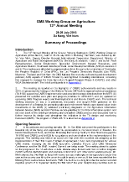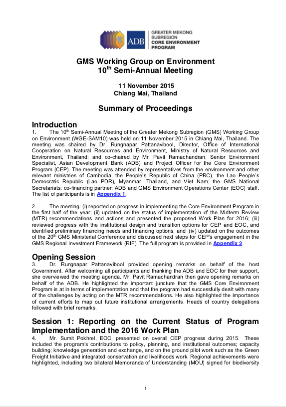How Mangrove-Friendly Shrimp Farming Is Protecting the Mekong Delta
At the southernmost tip of the Mekong Delta, Vietnamese shrimp farmers are going organic and restoring mangrove forests to help protect coastal communities against sea level rise.
Agriculture is the backbone of the Greater Mekong Subregion’s economies. With over 60% of the subregion’s 340 million inhabitants engaged in small-scale agriculture, it directly supports the livelihoods of nearly 200 million people.
The Working Group on Agriculture (WGA) has been working toward the implementation of priority projects under the Core Agriculture Support Program.
Agriculture is the cornerstone of many families’ livelihoods, however it is also exacting a toll on the environment, contributing to forest and biodiversity loss, water pollution and shortages, soil degradation, and greenhouse gas emissions.
People and governments in the Greater Mekong Subregion (GMS) are working to develop agricultural practices that simultaneously conserve land and water resources, while at the same time increasing the productivity and profitability of agriculture, particularly for small-scale farmers.
The GMS Economic Cooperation Program Strategic Framework 2030 (GMS-2030), endorsed and adopted at the 7th GMS Summit of Leaders in September 2021 to provide a new setting for the development of this subregion for the next decade, notes that in the agriculture sector, GMS-2030 will promote higher food safety and quality standards for expanding exports, for which an alignment of policies and standards will be required in the subregion. GMS-2030 will encourage climate- and environment-friendly production practices along the value chain, as well as sustain natural assets with a focus on small-scale farmers and micro, small, and medium-sized agro-enterprises. Given that COVID-19 has adversely impacted agricultural supply chains, GMS-2030 will support food security response and recovery efforts in the medium and long terms.
The GMS Sustainable Agriculture and Food Security Program (GMS SAFSP), implemented in 2019,has been designed to assist the GMS countries to tackle key climate change challenges to their agricultural sectors.Its three themes are: (i) climate-friendly, inclusive, and gender responsive agri-food value chains and agribusiness; (ii) climate-adaptive agriculture in the context of water-energy food nexus; and (iii) harmonized crop and livestock safety and quality systems.
The SAFSP was prepared in response to the recommendations of GMS agriculture ministers in 2017. They expressed a joint vision of promoting the GMS as a leading supplier of safe, quality and climate-friendly agri-food products. Achieving this vision depends on overcoming multiple barriers along the agrifood value chains. The ministers endorsed the Strategy for Promoting Safe and Environment Friendly Agro-Based Value Chains in the GMS at the 2nd GMS Agriculture Ministers' Meeting in Siem Reap, Cambodia on 6-8 September 2017. The Strategy aims to promote safe and environment-friendly agriculture products, and a plan to strengthen value chain integration, involving smallholder farmers, rural women, as well as small and medium-sized agro-enterprises.
The GMS SAFSP builds on the achievements of the GMS Core Agriculture Support Program (CASP) phase I (2006-2012) and phase II (2011-2020).
Related
• Strategy for Promoting Safe and Environment-Friendly Agro-Based Value Chains and Siem Reap Action Plan, 2018-2022
• Core Agriculture Support Program Phase II (2011-2015)
• Core Agriculture Support Program Phase I (2006-2010)
• GMS Sustainable Agriculture and Food Security Program Newsletter
• Working Group on Agriculture (WGA)
Focal Persons at the Asian Development Bank
Srinivasan Ancha
Climate Change, Resilience, and Environment Cluster
Climate Change and Sustainable Development Department
Renalyn Asuncion Padilla
Agriculture, Food, Nature, and Rural Development Sector Office
Sectors Group
Other Concerned Staff & Consultants
Asadullah Sumbal
Regional Cooperation and Integration Unit
Southeast Asia Department
Rafaelita Jamon
Regional Cooperation and Integration Unit
Southeast Asia Department/GMS Secretariat
Send inquiries to GMS CCESP Secretariat and GMS Secretariat.
At the southernmost tip of the Mekong Delta, Vietnamese shrimp farmers are going organic and restoring mangrove forests to help protect coastal communities against sea level rise.
Monster Fish biologist spearheads a research project on how to sustainably manage one of the world’s most important ecosystems.
Safe, organic food is becoming popular across the Greater Mekong Subregion. A pilot program in Thailand is helping farmers meet the growing demand and leave chemicals behind.
BANGKOK, THAILAND (31 May 2017) — The Asian Development Bank and the Greater Mekong Subregion Working Group on Agriculture today opened a series of events on the theme "Discover GMS: Asia's Natural Hub" during the Thaifex World of Food 2017 at Bangkok's Impact Exhibition Center from 31 May to 4 June.
New laws, policies, training centers—and plenty of infrastructure upgrades like water pumps and irrigation systems—are helping Vietnamese farmers deal with the challenges of weather, geography, and climate change.
DA NANG, VIET NAM (29 July 2016) – At the 13th Annual Meeting of the Working Group on Agriculture of the Greater Mekong Subregion, agriculture officials discussed ways to improve food safety and trade, climate friendly agriculture and bioenergy and biomass management.

This is the summary of proceedings from the 13th Annual Meeting of the Greater Mekong Subregion Working Group on Agriculture held on 28-29 July 2016 in Da Nang, Viet Nam.
PHNOM PENH, CAMBODIA (10 November 2015) – Cambodia and the Asian Development Bank today signed loan and grant agreements totaling $64 million for two projects which will further improve the country’s irrigation schemes and malaria control and monitoring systems.

This is the summary of proceedings from the 12th Meeting of the Greater Mekong Subregion Working Group on Agriculture held on 25 to 26 June 2015 in Bangkok, Thailand.

This is the summary proceedings from the 3rd Joint Knowledge Event of the the Greater Mekong Subregion Working Groups on Agriculture and Environment held in Bangkok, Thailand on 24 June 2015.